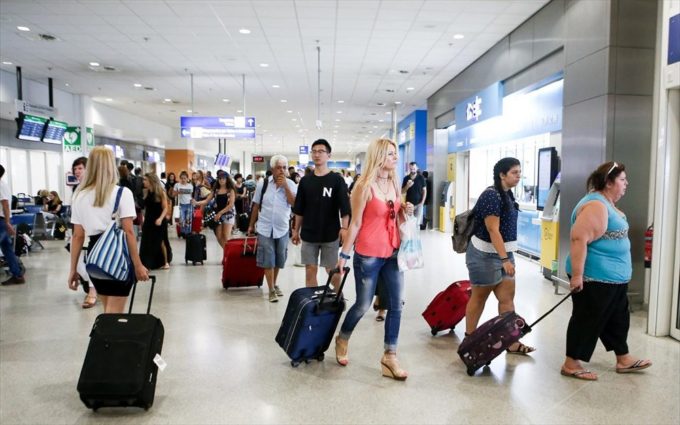By Anna Isaac
Aug

(Telegraph) — President Tayyip Erdogan of Turkey has told his citizens to sell their savings held in euros and dollars and buy lira in order to prop up the lira, citing an “economic war” after the country’s currency has plummeted.
The value of the Turkish lira has dropped sharply, ramping up fears of a contagion effect across emerging markets that could damage the world economy.
The lira lost 12pc against the dollar on Friday following an escalation of the tensions between Turkey and America. The currency has shed 22pc of its value since late July.
Turkey’s currency woes now place it ahead of Argentina in terms of its weakening against the dollar this year. The lira has depreciated by almost 40pc in 2018, compared to the peso’s more than-30pc fall since the start of the year.
Salman Ahmed at Lombard Odier said that the Turkish central bank’s inaction in the face of a “credit-fuelled overheating of the economy” lay behind the downward forces acting on the lira and other assets.
As the currency has become cheaper, concerns about inflation -the buying power it holds – have mounted.
However, while Argentina sought to combat the sudden uptick in inflation by hiking interest rates to more than 40pc and seeking a bailout from the IMF to combat capital flight – when investors suddenly withdraw funds – Turkey has made no such steps.
Mr Erdogan has previously described himself as “an enemy of interest rates” and told state TV ahead of a speech on Friday that “we will not lose the economic war”.
Within hours of being sworn in this July, Mr Erdogan appointed his son-in-law, Berat Albayrak as finance minister, and granted himself sole power to appoint rate setters at the central bank.
The move further undermined investor confidence in the country, citing a lack of independent monetary policy.
A key meeting on July 24 saw the central bank hold rates steady rather than raise them to combat inflation.
Mr Ahmed said: “This latest bout of negative sentiment is partially a result of the central bank’s reluctance to commit to continued monetary tightening under Erdogan’s watchful eye.
Paul Greer at Fidelity International said dramatic interventions were now needed as Turkey faced a “downward spiral” of investor confidence.
These could include the appointment of “pragmatic technocrats” and severe fiscal austerity to address high debt levels.
An immediate “aggressive interest rate hike” was also needed, Mr Grier said, with something of the order of 1,000 basis points as seen in Argentina this year. Such a move would slow the country’s economy down, after it had overheated considerably.
Some economists have suggested that capital controls may be imposed; these are limits on the money that can move in and out of a country.
These alone will not be enough shore up the economy, but they might help address the problem of capital flight.
Turkey is just one of the emerging market economies experiencing “cooling growth momentum and higher inflationary pressures” according to Mr Grier, “all of which keeps investors on the backfoot”.
Aug

“These next few weeks are proof of the remarkable transition the country has undertaken from financial crisis to robust recovery,” Stergioulis said in an- emailed press statement, citing two upcoming events as evidence of the change.
In late August, Greece is exiting the last of three successive European financial assistance programs, ending more than eight years of special oversight by its Eurozone partners.
A few weeks later, in early September, Greece will host Thessaloniki International Fair (TIF), an annual, flagship trade fair in the northern city of Thessaloniki. More than 1,400 exhibitors and close to 300,000 visitors — almost 50 percent more visitors than just two years ago — are expected.
The growing success of the TIF is representative of Greece’s turnaround story, Stergioulis said.
Emerging from recession last year, the country’s economy is now growing at a 2 percent rate, led by an export boom. Last year, exports rose more than 13 percent to a record high of 29 billion euros (33.2 billion U.S. dollars) and are on track to set a new record this year, while foreign investment in Greece is back to pre-crisis levels.
“Greece is stepping up its privatizations drive, economic sentiment is at pre-crisis levels, and unemployment is steadily declining. After years of painful cutbacks, the Greek government budget is in surplus,” the official noted.
“Enterprise Greece supports the outward orientation of the Greek economy… Last year, Enterprise Greece organized Greek participation at 45 international exhibitions abroad, 30 training seminars on export procedures, and supported more than 1,100 small- and medium-sized businesses interested in exporting to foreign markets…This year it is organizing trade delegations to 57 international exhibitions, a quarter more than last year,” Stergioulis added. (1 euro = 1.15 U.S. dollars)
Aug

Μεγάλη αύξηση αφίξεων ξένων τουριστών στα ελληνικά αεροδρόμια καταγράφουν τα στοιχεία από την ΥΠΑ, τη Fraport και τον Διεθνή Αερολιμένα Αθηνών για το επτάμηνο Ιανουαρίου- Ιουλίου. Συνολικά υπολογίζεται ότι περισσότεροι από 3 εκατ. επιπλέον επιβάτες εξωτερικού διακινήθηκαν φέτος στην Ελλάδα ως και το τέλος Ιουλίου σε σχέση με την προηγούμενη χρονιά.
Τα στοιχεία δείχνουν ότι οι συνολικές αφίξεις μπορεί να ξεπεράσουν και τα 33 εκατ., καθώς τόσο οι οδικές αφίξεις, όσο και η κρουαζιέρα κινούνται φέτος ανοδικά, συμπαρασύροντας και τα έσοδα.
Συγκεκριμένα, καταγράφεται μεγάλη αύξηση 13,7% στο επτάμηνο Ιανουαρίου-Ιουλίου 2018 στις αφίξεις επιβατών εξωτερικού στα 14 περιφερειακά αεροδρόμια που διαχειρίζεται η Fraport, σε σχέση με το αντίστοιχο χρονικό διάστημα του 2017. Επιπλέον 1,5 εκατ. ξένοι επισκέπτες πέταξαν με απευθείας αεροπορικές πτήσεις από αεροδρόμια του εξωτερικού προς 14 ελληνικούς προορισμούς (2018 – 12,1 εκατ. 2017 – 10,6 εκατ).
Ακόμη υψηλότερη ήταν άνοδος για το ΔΑΑ «Ελ. Βενιζέλος» όπου οι αφίξεις επιβατών εξωτερικού ξεπέρασαν τα 9 εκατ. στο επτάμηνο, καταγράφοντας αύξηση 15%. Περισσότεροι από 1,2 εκατ. επιπλέον ξένοι επισκέπτες πέταξαν από αεροδρόμια του εξωτερικού προς την Αθήνα το 2018 ως και το τέλος Ιουλίου (2018 – 9,03 εκατ. 2017 – 7,85 εκατ.). Την ίδια στιγμή για πρώτη φορά οι επιβάτες εξωτερικού στο αεροδρόμιο «Ν.Καζαντζάκης» του Ηρακλείου ξεπέρασαν στο επτάμηνο τα 1,85 εκατ.
Πηγή: ΑΜΠΕ
Aug

Στο… συρτάρι του υπουργείου Εργασίας παραμένουν εννέα προγράμματα σχεδιασμένα για την καταπολέμηση συγκεκριμένων φαινομένων, όπως, για παράδειγμα, το brain drain, αλλά και προσαρμοσμένα στις ιδιαίτερες ανάγκες κάθε γεωγραφικής περιφέρειας, τα οποία αναμένεται να ενεργοποιηθούν τους επόμενους μήνες, με στόχο, έως το τέλος του έτους, το ποσοστό ανεργίας να «σπάσει» το φράγμα του 20%. Αναλυτικά, τα προγράμματα που έχουν σχεδιαστεί σε συνεργασία με τον ΟΑΕΔ αφορούν:
1. Παρέμβαση ένταξης στην αγορά εργασίας 10.000 ανέργων ηλικίας 29-64 ετών, σε δυναμικούς κλάδους της οικονομίας, με έμφαση στον αγροτοδιατροφικό, στον τεχνολογικό, καθώς και στους κλάδους πληροφορικής και επικοινωνιών. Περιλαμβάνει θεωρητική κατάρτιση 120 ωρών, συμβουλευτική υποστήριξη, πιστοποίηση και πρακτική άσκηση σε επιχειρήσεις του ιδιωτικού τομέα, η οποία δεν θα υπερβαίνει τους πέντε μήνες.
2. Κατάρτιση και πιστοποίηση 10.000 ανέργων ηλικίας 29-64 ετών σε κλάδους που παρουσιάζουν προοπτικές ανάπτυξης. Το πρόγραμμα περιλαμβάνει θεωρητική κατάρτιση 120 ωρών, συμβουλευτική υποστήριξη, πιστοποίηση και πρακτική άσκηση σε επιχειρήσεις του ιδιωτικού τομέα, η οποία δεν θα υπερβαίνει τους 5 μήνες.
3. Επιδότηση νέων θέσεων εργασίας για 15.000 ανέργους ηλικίας 18-29 ετών, με έμφαση στους πτυχιούχους. Η πρώτη φάση του προγράμματος περιλαμβάνει 10.000 νέους ανέργους και έχει ήδη ξεκινήσει, ενώ αναμένεται η δεύτερη φάση με άλλους 5.000, κατά κύριο λόγο πτυχιούχους ΑΕΙ και ΤΕΙ, προκειμένου να απασχοληθούν σε νέες θέσεις εργασίας πλήρους απασχόλησης, του ιδιωτικού ή κοινωνικού τομέα της οικονομίας.
4. Επιδότηση νέων θέσεων εργασίας για 6.000 ανέργους ηλικίας έως 35 ετών αποφοίτων τριτοβάθμιας εκπαίδευσης σε μεταποιητικές/βιομηχανικές επιχειρήσεις. Το πρόγραμμα προβλέπει κατάρτιση των πτυχιούχων ανωτάτων ιδρυμάτων πανεπιστημιακού και τεχνολογικού τομέα και στη συνέχεια επιδοτούμενη πρόσληψή τους σε μεταποιητικές/βιομηχανικές επιχειρήσεις.
5. Ολοκληρωμένη παρέμβαση για 4.500 αποφοίτους λυκείου έως 29 ετών. Πρόκειται για πρόγραμμα κατάρτισης 200 ωρών για απασχόληση σε περίπου 10 επαγγελματικές ειδικότητες (τεχνικές και του τομέα των υπηρεσιών). Η διάρκειά του μπορεί να φθάνει και τους 14 μήνες, ενώ το ύψος επιχορήγησης θα ξεκινά από 360 ευρώ τον μήνα για κάλυψη μισθολογικού και μη μισθολογικού κόστους.
6. Επιδότηση 2.500 ανέργων για τη δημιουργία της δικής τους επιχείρησης σε δυναμικούς κλάδους της οικονομίας που ενσωματώνουν την καινοτομία.
7. Επαγγελματική κατάρτιση και επιδοτούμενη πρόσληψη 4.000 ανέργων στον κλάδο της εφοδιαστικής αλυσίδας (logistics) και στο εξαγωγικό εμπόριο.
8. Δράσεις κατάρτισης για 2.000 άτομα με αναπηρία. Η επιδότηση θα ανέρχεται μέχρι του ποσού των 700 ευρώ μηνιαίως για τους εργαζομένους με πλήρη απασχόληση και μέχρι του ποσού των 350 ευρώ (μηνιαίως) για τους εργαζομένους με μερική απασχόληση.
9. Πρόγραμμα κοινωφελούς εργασίας 2.300 ανέργων σε κέντρα φιλοξενίας προσφύγων για οκτώ μήνες.
Πηγή: Kathimerini.gr